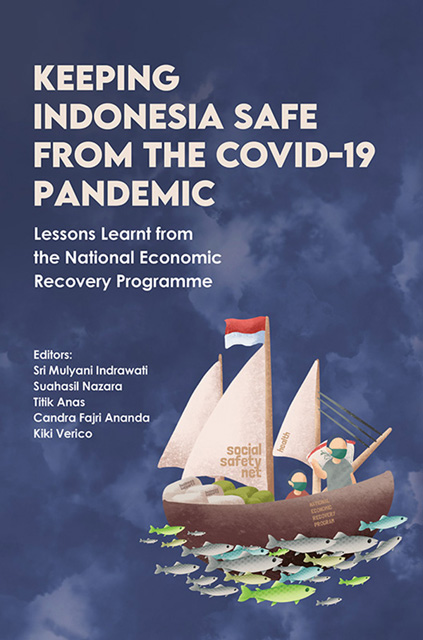 Keeping Indonesia Safe from the COVID-19 Pandemic
Keeping Indonesia Safe from the COVID-19 Pandemic Book contents
- Frontmatter
- Contents
- List of Figures
- List of Tables
- List of Boxes, Annexes and Appendixes
- Acknowledgements
- Glossary
- The Contributors
- Foreword: Keeping Indonesia Safe from the COVID-19 Pandemic Lessons Learnt from the National Economic Recovery Programme
- Part I Health Shock
- Part II Economic Shock: The Framework
- Part III Revenue Shock And Response
- Part IV Expenditure Side (Human Capital)
- Part V Expenditure Side (Msmes And Corporate Sector)
- Part VI Regional Dynamics
- Part VII New Ways Of Working
- Index
15 - Corporate Sector Performance during the COVID-19 Pandemic
Published online by Cambridge University Press: 30 June 2023
- Frontmatter
- Contents
- List of Figures
- List of Tables
- List of Boxes, Annexes and Appendixes
- Acknowledgements
- Glossary
- The Contributors
- Foreword: Keeping Indonesia Safe from the COVID-19 Pandemic Lessons Learnt from the National Economic Recovery Programme
- Part I Health Shock
- Part II Economic Shock: The Framework
- Part III Revenue Shock And Response
- Part IV Expenditure Side (Human Capital)
- Part V Expenditure Side (Msmes And Corporate Sector)
- Part VI Regional Dynamics
- Part VII New Ways Of Working
- Index
Summary
INTRODUCTION
The private sector accounts for more than 90 per cent of the total Indonesian GDP and plays an important role in the Indonesian economy and employment. This chapter focuses on non-financial large and medium businesses which are the main economic drivers of the private sector. Nonfinancial large and medium businesses account for approximately half of the total private sector contribution to real GDP. Following this introductory section, section 15.2 describes Indonesian corporate performance prior to COVID-19. Subsequently, section 15.3 discusses the economic impacts of COVID-19 that appeared in multiple non-financial sectors during 2020–21. Next, section 15.4 zooms in on the impact by looking at how financial pressure on corporates evolved within the 18-plus months from the beginning of the COVID-19 pandemic, which was subsequently followed by changes in government objectives and support. It is then followed by section 15.5 covering how the Government of Indonesia (GoI) has applied an adaptive policy approach with a better understanding of the COVID-19 pandemic and its impact on both the global and domestic economy. The last section summarizes the discussion as well as gives a reflective discussion on past policies and potential future interventions. Additionally, two case studies on Value Added Tax (Pajak Pertambahan Nilai, or VAT) are presented to provide evidence at a micro level to support the discussions at a macro level in the previous sections.
The COVID-19 pandemic hit the corporate sector hard, especially in 2020, as public authorities across the globe implemented unprecedented measures to contain the spread of the virus. Restrictions on mobility and social contact, school and business shutdowns, quarantine and border closures brought the economy to almost a standstill. Sales across many sectors were plummeting as demand fell sharply. While financial commitments with respect to workers, suppliers and lenders remained, firms had to face abrupt and sharp reversals in earnings. This situation has depleted the liquidity buffer of firms across many sectors. The risk caused by liquidity shortages in the corporate sector rose and potentially affected the stability of the financial system.
The impact of the pandemic was, nonetheless, heterogeneous across sectors, depending on each sector's reliance on social contact and mobility.
- Type
- Chapter
- Information
- Keeping Indonesia Safe from the COVID-19 PandemicLessons Learnt from the National Economic Recovery Programme, pp. 495 - 518Publisher: ISEAS–Yusof Ishak InstitutePrint publication year: 2022
